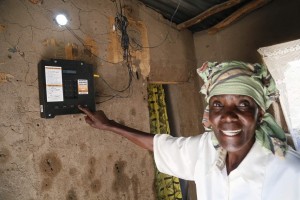
Elizabeth Mukwimba is a 62-year-old Tanzanian woman who now has solar lighting and electricity in her home at the flick of a switch, thanks to an off-grid project. Photo from Off-Grid Electric.
Tanzania exemplifies so much of the future of energy infrastructure in developing world countries, as Greenbiz describes:
The East African country of Tanzania faces a serious electrification challenge. Only 2 percent (PDF) of rural households have access to electricity, and most of the rural population relies on expensive, hazardous and low-quality fuels such as kerosene for lighting and charcoal for cooking.
Access to electricity and other modern energy services is fundamental to human well-being and to a country’s social and economic development. In many countries, electrification through off-grid applications has become a cost-effective alternative to conventional grid expansion in remote areas — and this could become a model that propels Tanzania’s next phase of economic growth. Already in the country, energy systems based on wind, small hydropower, biomass and solar resources are being used successfully to meet energy demand in isolated villages. By integrating these renewable-powered off-grid systems, rural communities are increasing their access to affordable energy supplies while contributing meaningfully to climate change mitigation.
Much like the leap to cell phones over landlines, many countries like Tanzania are better served going directly to decentralized, renewable technologies rather than building expensive and dirty traditional power grids with central-station power plants and far-flung transmission lines.
The upside is a cleaner, more resilient energy system with potentially few impacts on the land. It also means more immediate electrification for rural residents, rather than making them wait for government and utilities to build a centralized grid to reach them.
I note that in this article, batteries do not seem to be on the table for Tanzania’s rural areas, while biomass may make up a crucial portion of the electricity mix. I have nothing against biomass in concept, but depending on the technologies and incentives involved, it can sometimes lead to increases in emissions.
These opportunities in many ways come from the developed world’s investment in renewable technologies, which has brought prices down to the point where they are now viable options for poorer countries like Tanzania.


